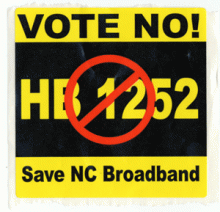Image


This trend is alarming to corporations like Time Warner and others in the broadband business, because municipal systems don't need to make a profit and can get money for infrastructure easily and at cheap rates. It's not, to use a phrase often used in this growing debate, a level playing field. That's why the telecommunications industry is backing a bill that will force municipal officials to get voter approval before setting up a network like Wilson's or Salisbury's. The sponsors say they're trying to level the field. In reality, in this time of tight budgets and fed-up taxpayers, it's more like kicking local government off the field and eliminating competition.
